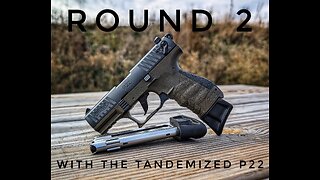Premium Only Content

UK Parliament vaccine debate - Dr. John Campbell
Official UK government report on the debate
Official UK Government YouTube channel, the debate in full for those interested
https://www.youtube.com/watch?v=pfgGCgxGYkk&t=0s
A few of John’s notes on immunity, from my books, free download site,
http://159.69.48.3/
(You will need to cut and past this address into search engine)
Acquired or adaptive immunity only develops after there has been contact with a particular antigen. An individual is said to be immune to a particular pathogen when it may be introduced into the body, without causing illness. In contrast to innate immunity, the immune system is changed as a result of exposure to a particular antigen.
Acquired immunity is specific to a particular antigen. For example, previous exposure to the measles virus will have allowed the immune system to adapt, generating immunity to any future measles infection. However, because the response is specific, the individual may still suffer from mumps, influenza, or indeed any other antigenic organism it has not previously been exposed to.
Antigens (antibody generators)
An antigen is anything the immune system recognises as being foreign. When detected, antigens generate an immune response in the body. It is antigens which stimulate the production of antibodies, which are the immune proteins. Usually an antigen is a foreign protein that the body recognises as non-self. The outer coatings of bacteria and viruses contain such foreign proteins. Non-protein large molecules (with a molecular mass of over 1000) will also be antigenic if introduced into the body. So a wide variety of living and non living things can act as antigens; such things are said to possess antigenicity. The specific component of an antigen the immune system recognises as foreign is termed an epitope.
Cells involved in adaptive immunity
The important classification of white cells involved in adaptive immunity is the small lymphocytes. Small lymphocytes have a large nucleus with only a small area of cytoplasm. In addition to being found in the blood, there are many small lymphocytes in the structures of the lymphatic system, such as the spleen, tonsils and lymph nodes.
Small lymphocytes are able to recognise antigenic material, this is essential if they are to mount an immune response. It is estimated that small lymphocytes are capable of producing 100 million different shapes of surface receptors in order to recognise 100 million different forms of antigen. This diversity seems to allow the immune system to recognise all of the possible antigens on the surface of the planet.
-
 12:40
12:40
Chris From The 740
1 day ago $3.94 earnedIs The Walther P22 Still Trash? Let's Find Out
32.1K12 -
 1:00:37
1:00:37
Trumpet Daily
23 hours ago $8.27 earnedThe Cause of ‘Natural’ Disasters - Trumpet Daily | Jan. 10, 2025
37.4K24 -
 33:41
33:41
PMG
13 hours ago $1.56 earnedHannah Faulkner and Haile McAnally | OMAHA YR RACE
17.6K4 -
 21:24
21:24
The Based Mother
1 day ago $3.67 earnedThis is not a drill - California is set on self-destruction.
21.9K18 -
 35:23
35:23
CutJibNewsletter
1 day agoWhere Crosses and Cities Burn, soon People Burn, and Dems have the Matches
271 -
 6:06:49
6:06:49
Sgt Wilky Plays
16 hours agoFirefight Friday
89.6K6 -
 5:03:49
5:03:49
Drew Hernandez
19 hours agoLA MAYOR PUSHED $49 MILL LAFD BUDGET CUT ONE WEEK BEFORE FIRES?
137K84 -
 2:52:04
2:52:04
Nobodies Gaming
14 hours ago $7.15 earnedNobodies Rumble Gaming TEST STREAM 2.0
85.7K3 -
 1:00:36
1:00:36
Talk Nerdy 2 Us
13 hours agoDigital Surveillance, TikTok Shutdowns & The Hackers They Don’t Want You to Know About!
69.2K10 -
 3:08:37
3:08:37
SpartakusLIVE
16 hours agoDelta Force || Tactical, Strategic, HARDCORE
69.2K2